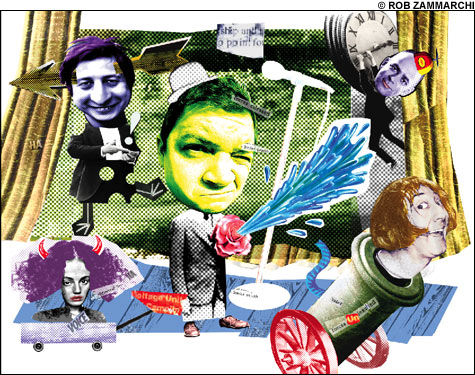
LEFT TO RIGHT: Morgan Murphy, Eugene Mirman, Patton Oswalt, Rob Barry, and Emo Phillips (in cannon.) |
“Ashlee Simpson’s new album sold so poorly,” snorted the headline on Yahoo! this past week, that “it was beaten by a comedy album.”Yup, she of the shiny new schnoz was eclipsed by Flight of the Conchords, whose full-length debut logged in at number three on Nielsen/SoundScan’s best-seller list — the highest ranking for a comedy album since Steve Martin’s A Wild and Crazy Guy charted 30 years ago. But should we be that surprised?
First, Ashlee Simpson is terrible. But more to the point, we’re living in the best and most rewarding time for comedy in recent memory. “Not only in the mainstream, visible sense, with people like Tina Fey and Judd Apatow making comedies,” says Patton Oswalt, who headlines the second night of the (hopefully first-annual) AltCom Festival at the Somerville Theatre on Saturday, “but also in an open-mic sense: there’s this wave of comedians that are just fantastic that you’ve never heard of. There are a lot of new faces coming up. It’s very vibrant.”
Everywhere you look these days, in every medium possible: more funny. Stand-up (Jim Gaffigan, Paul F. Tompkins, Brian Posehn, Jen Kirkman, Doug Benson, Maria Bamford, Andy Kindler) is just the beginning. There’s also television (Human Giant, Adult Swim, The Daily Show, The Colbert Report); radio and podcasts (Scharpling and Wurster, Never Not Funny); books (John Hodgman, Neal Pollack); freeform on-stage whateverness (Zach Galifianakis, Neil Hamburger, Tim and Eric, Glaser and Benjamin); musical comedy (Flight of the Conchords, Tenacious D); viral videos (Sarah Silverman, Will Ferrell); even prank phone calls (Earles and Jensen).
Two decades ago, the success strategy for a comedian was pretty straightforward. 1) Slog it out in an endless procession of glass-clinking laff factories. 2) Hope to be spotted by one of Johnny Carson’s spies. 3) Play the Tonight Show and pray Carson calls you over for a chat. 4) Score a TV or movie role. 5) Repeat step 4.
Nowadays, though, things are different. In recent years, several factors — the rise of alternative performance spaces, a supportive and symbiotic relationship between musicians and comedians, and, especially, the Internet — have changed the rules. Comedians are far freer to plot their own courses. The result is a massive efflorescence of endlessly creative comedy. And we, the discerning comedy audience, are the beneficiaries.
Kingdom of comedy
The AltCom festival — which also features Emo Philips, Todd Barry, Eugene Mirman, The Walsh Brothers, Morgan Murphy, Jim Jeffries, and doktor cocacolamcdonalds (See altcomfestival.com. Disclosure: the Phoenix is a festival sponsor.) — was founded by Southie-via-Somerville stand-up Brian Joyce in emulation of the “small, independently run boutiquey” fests he’s encountered in Europe. It’s an excellent showcase for this comedic boom time. But what, precisely, is AltCom? It’s a slippery term, one that may or may not have any actual significance.
“AltCom stands for alternative comedy, with the ‘com’ part cleverly — and with astounding efficiency — also reflecting that ever-expanding cornucopia of alternative comedy, the Internet,” writes Philips, considered by many to be alternative comedy’s paraprosdokian-spouting paterfamilias, in an e-mail interview. (“Ironically, the Web domain altcom.com seems to have been grabbed up by some Polish Web-domain squatter,” he adds in a parenthetical. “It’s a sad sign of the American dollar’s current sickliness that we couldn’t afford to buy it off him.”)
Mirman is agnostic about the term’s value. “I dunno. Is ‘modern rock’ a thing? Or ‘alternative music’? It sort of vaguely describes something. Is it helpful? I guess. But are there alternative comics who are huge and sell millions of records, or play giant venues? Sure.”
“If you look at the lineup, it’s all comedians that were around before the term [alternative comedy] ever existed,” says Barry. “Emo’s been doing comedy for years. He’s a joke-teller. And I’m a joke-teller. It’s a great lineup, and [AltCom will] be a great show, and it looks like a really beautiful theater. But I’m not walking around going, ‘I’m an alternative comic.’ ”
The best way to define alternative comedy, then, is probably by what it is not. It is not the massively, inexplicably successful Dane Cook, strutting smirkingly astride the stage in a faux-retro T-shirt, product in his hair and unfunny inanities spewing from his mouth. It is not Larry the Cable Guy (“Git ’er dun!”) or alleged joke thief Carlos Mencia.
The comedians on the AltCom bill clearly have a diverse array of material and deliveries. But they also share a definite sensibility — smart, sometimes cynical, probably left-of-center — that’s usually shared by their fans.